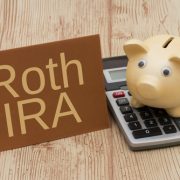Take Full Advantage of a Self-Directed Roth IRA
A Self-Directed Roth IRA is a retirement savings account that offers you a variety of investment choices, all of which can grow tax-free. You fund a Roth with after-tax dollars, which means you do not get to take a tax deduction upfront as with a Traditional IRA. In return, however, your money grows tax-free, and when you withdraw it at retirement, you do not owe taxes on it.
While the purpose of Self-Directed Roth IRAs is to help you save for retirement, there is a certain amount of flexibility within them. For instance, you may withdraw money penalty-free for medical expenses, college, emergencies, and, if you qualify, purchasing your first home.
Anyone who has earned income may open a Self-Directed Roth IRA, although there are income eligibility requirements that will determine how much, or even if, you may contribute.
A Self-Directed Roth IRA should be earmarked for your retirement, but occasionally life’s events can interfere with your plans. The Roth can give you options when you have no others.
You are allowed to withdraw your contributions before you turn 59 ½ without penalty
You may withdraw contributions to a Self-Directed Roth IRA at any time without tax or penalty. But you may only withdraw the earnings on your funds when you turn 59½ and five tax years have passed since your first contribution. As mentioned, there are some exemptions from this rule.
Some people open Self-Directed Roth IRAs as a kind of backup savings account. It allows them to save for retirement knowing that the money is available in case they are hit with an emergency.
You may use your Self-Directed Roth IRA funds to pay for school
You are allowed to take penalty-free distributions from your Self-Directed IRA (before turning 59 ½) to pay for qualified, higher-educational expenses. As long as you have owned the account for five years, you may take qualified distributions—contributions and earnings—to pay the educational costs for your wife/husband, children, grandchildren, and, of course, yourself. The distributions may not be more than the actual schooling expenses.
Withdrawing funds from a Self-Directed Roth IRA as a first-time homebuyer is OK
According to Self-Directed Roth IRA rules, a first-time homebuyer may withdraw funds from the account as long as the following conditions have been met:
- The account has been opened for at least five years.
- you withdraw $10,000 or less for the purchase.
- The funds are used directly for a down payment, closing costs, and other acquisition expenses.
If these rules are followed, the withdrawal will count as a qualified distribution.
How does the IRS define a first-time homebuyer? Well, they consider you a first timer if you have not owned a home in the last two years. So, if you owned a principal residence six years ago, there is a good chance you will qualify as a first-time buyer.
Other exemptions from paying a 10% penalty for early withdrawals
In addition to the exceptions for higher education expenses and for being a first-time homebuyer, the following are also listed by the IRS as qualified distributions:
- You have reached the age of 59 ½.
- You have become totally and permanently disabled.
- You are the beneficiary of a deceased IRA owner.
- You have unreimbursed medical expenses that are more than 7.5% of your adjusted gross income for the year.
- You are paying medical insurance premiums during a period of unemployment.
Some of the most significant benefits of a Self-Directed Roth IRA come at retirement
Some people feel they need relief from a high tax bill right now. For them, contributing to a Traditional IRA provides them with a tax deduction they cannot get with a Roth.
But by taking that tax break today, they will be missing out on many of the valuable benefits that a Roth can offer down the road.
- A tax-free stream of income in retirement.
- No required minimum distributions.
- Being able to contribute as long as you want.
- You can leave your beneficiaries tax-free income that can be stretched over their lifetime.
With all of the valued benefits of a Self-Directed Roth IRA, contributing to this tax-free option is worth giving serious consideration.
Interested in learning more about Self-Directed IRAs? Contact American IRA, LLC at 866-7500-IRA (472) for a free consultation. Download our free guides or visit us online at www.AmericanIRA.com.









